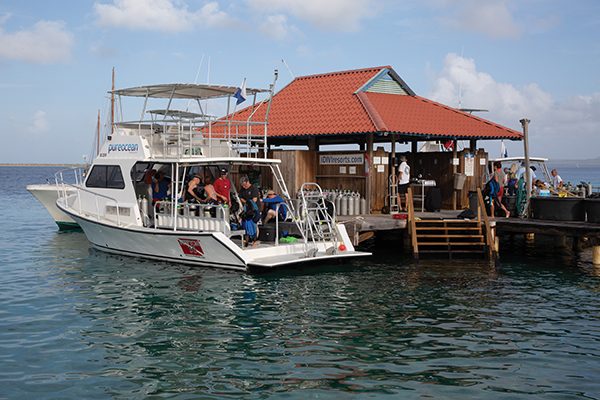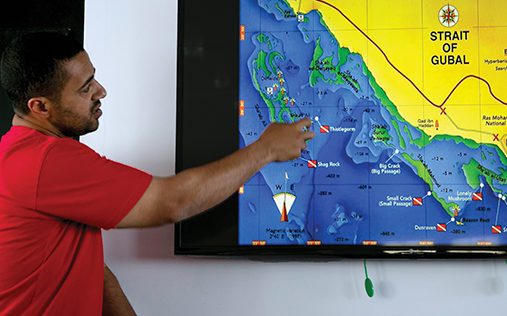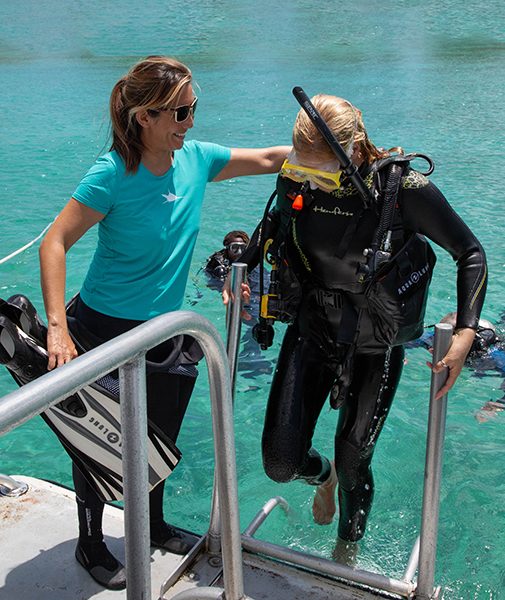SAFER
DIVE BOAT
OPERATIONS

AMONG THE PRIMARY RESPONSIBILITIES of a boat owner or operator are the safety of the vessel, passengers, crew, and captain. Taking care of divers on board requires additional considerations. Here are a few tips to ponder and include in your interactions with your divers to help ensure trouble-free boat diving. These are based on DAN’s experiences and include some often-overlooked areas.
Boarding the VessEL
It is a good idea to designate specific areas of the boat for specific types of equipment. Point out the cameras-only bin as well as storage areas for spear guns and dry gear.
As any seasoned dive boat crew member will tell you, it is easy to spot who is experienced and inexperienced just by observing how they stow their gear and how they assemble it. As divers are assembling their equipment, take a moment to see if anyone needs assistance, and offer to help if needed.
Dive Site Briefings
One of the most important aspects of a dive is a proper site briefing. It is helpful to give particulars about the site, including depths, drop-offs, visibility, thermoclines, currents, and known hazards such as certain marine life, overhead environments, and entanglement risks. Be sure to point out some key features that divers may want to look for during their dive.
Of particular importance are entry and exit procedures. Emphasize risk areas, such as the ladder or around the propeller(s) — these are of particular concern. If the boat is utilizing a “live boat” pickup of divers, be sure all divers understand the procedure for your vessel. Also inform divers what the recall signal will be in the event of an emergency.
During the Dive
As you know, just because divers are no longer on the boat does not mean you can just sit back and relax. There should always be a lookout monitoring the divers, especially when seas are rougher. Ensure the dive flag and/ or alpha flag are properly displayed. This is also a good time to resecure any equipment that may have been left unsecured during the gear-up and entry process.
AT THE END OF the Dive
The end of a dive presents some notable hazards for divers. Moving ladders, heavy seas, spinning propellers, and divers slipping back into the water on top of others are examples of potential hazards. As divers are ending their dive, help them get back on board using the method(s) covered in your dive briefing. Encourage divers to keep their regulator in their mouth until they are safely back on board. Assist with any accessories they may have, such as cameras, SMBs, fins, and spear guns. Help divers secure their gear as they are getting seated and removing their scuba unit.
It is essential to do a formal, recorded roll call after all divers are thought to be out of the water to ensure you have everyone on board before you depart the site.
RETURNING TO THE DOCK
AND DISEMBARKING
Assist divers with their gear as they are getting off the boat. This is not only courteous but also helps keep divers safe; engaging in strenuous physical activity after a dive may increase the risk of DCI, so help your guests avoid overexerting themselves.
IN SUMMARY
Diver safety is paramount for the dive operator during boat excursions. Courteous staff and safe, enjoyable dives are signs of a good operation and will help grow your clientele. Take the time to prepare and look after your divers, and they will look after you.


DAN Customer Service
Mon–Fri, 8:30 a.m. – 5 p.m. ET
+1 (919) 684-2948
+1 (800) 446-2671
Fax: +1 (919) 490-6630
24/7 Emergency Hotline
In event of a dive accident or injury, call local EMS first, then call DAN.
24/7 Emergency Hotline:
+1 (919) 684-9111
(Collect calls accepted)
DAN must arrange transportation for covered emergency medical evacuation fees to be paid.
Medical Information Line
Get answers to your nonemergency health and diving questions.
Mon–Fri, 8:30 a.m. – 5 p.m. ET
+1 (919) 684-2948, Option 4
Online: Ask A Medic
(Allow 24-48 hours for a response.)
